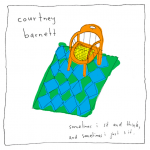
Courtney Barnett Sometimes I Sit and Think, and Sometimes I Just Sit
(House Anxiety / Marathon Artists)
It’s easy to miss how much of a pessimist Courtney Barnett is. Ever since her breakout song Avant-Gardener (which as I’ve told anyone who’ll listen is one of the best songs ever), Barnett has paired breezy, slightly stoned indie-rock jamming with lyrics about intense, overbearing anxiety – the point being that the music masks the feeling. The juxtaposition isn’t as oxymoronic as it sounds; the two moods are entirely compatible, and that’s crucial to the political dimension of her songwriting. To put it in terms that would only overstate the surface-level appearance of what’s still a power-chord-driven slacker-rock record, she’s tapping into something true and depressing about contemporary ideology, our tendency to recognise and understand the profound injustice of our position of privilege living in a developed nation, the casual indifference with which we have to forget this injustice – it’s part of the same feeling.
On Kim’s Caravan, after reading a newspaper headline about the destruction of the Great Barrier Reef, she muses “We either think that we're invincible or that we are invisible / When realistically we're somewhere in between” – it’s about the doublethink of collective responsibility for climate change and the impossibility of an individual to do anything about it. Similarly, on Dead Fox: “Jen insists that we buy organic vegetables / And I must admit that I was a little sceptical at first / A little pesticide can't hurt”. Who can be blamed for taking the easier path when ethical consumerism is so expensive and time-consuming?
These ethical quandaries of late capitalism are the backdrop for Barnett’s storytelling, the context of her characters’ anxieties. In spite of her penchant for wordplay, her songwriting is focused, her songs read like short stories - unlike most of the 90s indie rock bands she sounds like, Barnett just doesn’t do abstract. The record’s opener, Elevator Operator, is a tale about a 20-year-old white-collar worker who breaks out of the daily routine, skips work and heads to the top of Melbourne’s Nicholas Building. When a woman with a snakeskin bag and a “botox frown” tries to intervene he tells her “I'm not suicidal, just idling insignificantly / I come up here for perception and clarity / I like to imagine I'm playing SimCity”. The song flirts with cliché, but manages to avoid it in its bathetic conclusion – we’d like to make grand gestures but nothing really happens. Her characters are people who can’t quite decide what they want – “I wanna go out but I wanna stay home” goes the chorus to Nobody Really Cares If You Don’t Go to the Party. A familiar feeling,
The real selling point of Barnett is her voice – mostly because it’s so refreshing to hear her Australian enunciation; there’s a dearth of Aussies and Kiwis in the Western critical eye, and the handful of renowned Australian bands I can think of don’t sing with detectably Aussie vocals. Not that it’s just about the novelty of her accent, it’s her casual, half-spoken delivery, her ability to sound likeable even when she’s singing something so self-excoriating as “Tell me I’m exceptional, I promise I’ll exploit you” (Pedestrian At Best). She reminds me so much of Pavement’s Stephen Malkmus, (whose influence is unmistakable in her work), in that she does with her own accent what Malkmus did with the Californian drawl – emphasising its lackadaisical qualities and opting for the most musical lexical choices wherever possible.
Scarcely do her songs use more than three or four chords, which only really becomes a flaw when the tempo drops in the final two tracks; perhaps more imaginative arrangements would have transformed the slower songs into something really beautiful, but then again the mood of stagnation is kind of the point. Although Sometimes I Sit and Think is musically straightforward, Barnett doesn’t need anything more to tell great stories. Depreston contains just two chords, yet is probably the record’s finest track, where her gift for observation is at its most acute. As she’s toured round a bungalow in a Melbourne suburb, she becomes slowly aware that a person died in this house, unable to play the househunting game any more, too aware of her surroundings. Nothing changes, but the detail overwhelms her. And if there’s one thing Barnett excels at, it’s writing songs about being overwhelmed.
25 March, 2015 - 04:41 — Stephen Wragg